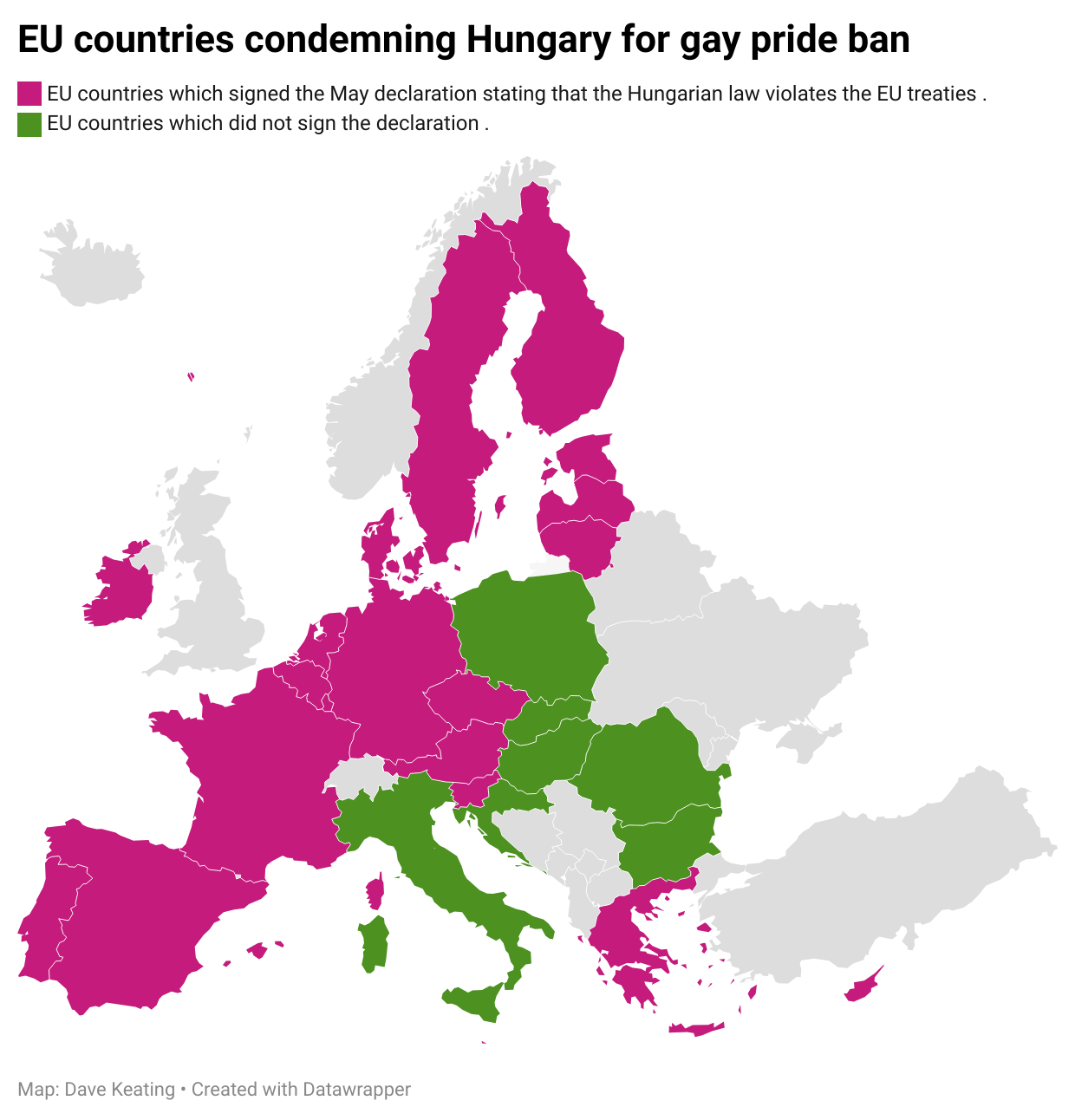Hungary is once again dividing EU leaders and other countries in the bloc over how to respond to its latest rule-of-law provocation: banning LGBT Pride events.
The organisers of Budapest Pride are planning to go ahead on 28 June in defiance of the ban, and people from all over Europe are planning to attend in solidarity with Hungary’s embattled sexual minorities. The question of whether the European Commission should join the fray has escalated into a bitter political fight.
On Wednesday — just two days after Euractiv reported that Commission President Ursula von der Leyen “recommended” that none of her commissioners should attend the Budapest march — 60 members of the European Parliament from across the political spectrum had signed an open letter registering their “deep disappointment and concern” at her decision.
“For years now, the Hungarian government has been initiating an anti-LGBTIQ+ campaign,” the MEPs wrote, adding that the Commission should support sexual minorities “not just in words, but in action.”
A Commission spokesperson denied the reports on Tuesday, saying that neither Von der Leyen nor anyone on her team had asked the college of 26 commissioners not to attend Budapest Pride. But so far, they are still not planning to send any Commission delegation to the event.
Von der Leyen’s office may be wary of provoking Hungarian Prime Minister Viktor Orbán, who has previously accused the EU of conducting an “LGBTQ offensive” and undermining the country’s Christian heritage. Sending a delegation from Brussels to an outlawed event could bolster that narrative among Orbán’s supporters.
The Hungarian law, passed in March this year, bans LGBT Pride marches on the pretext that they are a threat to children. It also allows the use of facial recognition technology to identify participants. As a result, organisers and participants in Budapest Pride — including members of any EU delegation — risk being charged and fined, possibly at a later date.
A familiar EU divide
On Tuesday, 20 out of the EU’s 26 other member states signed a declaration condemning the Hungarian law, as part of an ongoing debate over Hungary’s rule-of-law violations.
“We are concerned by the implications of these measures on freedom of expression, the right to peaceful assembly and the right to privacy,” the declaration read. The member states called on the Commission to investigate whether Hungary’s actions constitute a breach of the Treaty on European Union.

Words but no action
Issues impacting LGBT EU citizens are largely a matter of national law; the Commission has never made any effort to harmonise same-sex marriage or anti-discrimination laws across the bloc. Even the EU's Court of Justice has refused to rule on whether denying marriage recognition to same-sex couples coming from another EU member state violates freedom-of-movement rights. EU institutions don’t want to be seen as ‘pushing’ homosexuality on unwilling eastern members.
The current positioning of Italy makes any action particularly fraught for the Commission. The EU’s third-largest country has moved strongly away from LGBT rights under Prime Minister Giorgia Meloni. The president of Rome’s Lazio region, Francesco Rocca, has rescinded his government’s support for Rome Pride since he took office in 2023 on the grounds that it promotes gay people having children through surrogacy. He is a member of Meloni’s Brothers of Italy party, whose motto is “God, homeland and family.”
Meanwhile, the Commission continues to engage in high-profile messaging support for LGBT rights, both on its social media channels and in public statements. The Berlaymont headquarters is lit up in rainbow colours during Pride month every June — enraging far-right politicians across the EU, who capitalise on such images to tell their supporters that the EU is promoting homosexuality to children.
At the same time, the Commission refuses to take any concrete action that would help LGBT EU citizens in Italy and the east. They have arguably ended up with the worst of both worlds: imagery that drives a public perception of interference without the benefits that a real intervention would bring to LGBT people.
Von der Leyen has four weeks to change her mind about sending someone from the Commission to Budapest Pride. It is not without risk. But can the EU afford to be so divided as Russia wages war on its doorstep and the US targets the bloc with tariffs? That is the decision the Commission president will have to make.
Sign up to The Parliament's weekly newsletter
Every Friday our editorial team goes behind the headlines to offer insight and analysis on the key stories driving the EU agenda. Subscribe for free here.